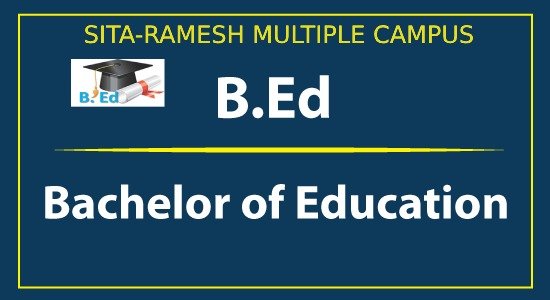Events
Bachelor of Education (B.Ed.)
The intended learning outcomes (ILOs) for a Bachel 2080-11-22 / 2 year(s) ago In-charge : 26The intended learning outcomes (ILOs) for a Bachelor in Education program may vary between institutions, but generally, they encompass a range of knowledge, skills, and attitudes that students are expected to acquire by the end of the program. Here is a broad set of possible intended learning outcomes for a Bachelor in Education program: Subject Matter Knowledge: Demonstrate a deep understanding of the subject matter within their chosen field of study. Integrate cross-disciplinary knowledge to provide a comprehensive educational foundation. Pedagogical Skills: Develop effective teaching methodologies and strategies. Design and implement instructional plans that cater to diverse learning styles and abilities. Utilize technology and innovative teaching methods to enhance the learning experience. Classroom Management: Apply effective classroom management techniques to create a positive and inclusive learning environment. Foster a safe and respectful atmosphere conducive to learning. Assessment and Evaluation: Design, implement, and evaluate various assessment tools to measure student progress. Use assessment data to inform and adapt teaching practices. Educational Psychology: Understand and apply principles of educational psychology to address the diverse needs of students. Implement strategies to motivate and engage learners. Communication Skills: Communicate effectively with students, parents, and colleagues. Develop strong interpersonal skills and cultural competence. Critical Thinking and Problem-Solving: Foster critical thinking skills in students. Demonstrate the ability to analyze educational issues and propose solutions. Professional Ethics and Reflective Practice: Uphold ethical standards in the teaching profession. Engage in reflective practice to continuously improve teaching methods. Inclusion and Diversity: Demonstrate an understanding of diversity in the classroom. Adapt teaching methods to address the needs of diverse learners, including those with special needs. Collaboration and Professional Development: Collaborate with colleagues, parents, and the community to support student learning. Engage in continuous professional development to stay informed about educational trends and research. Research Literacy: Develop basic research skills to stay informed about educational best practices. Apply research findings to improve teaching and learning. These intended learning outcomes aim to prepare graduates with the knowledge, skills, and attitudes necessary for a successful career in education. It's important to note that specific programs may have variations based on their unique goals, curriculum, and accreditation requirements.
 Sita Ramesh Multiple Campus
Sita Ramesh Multiple Campus 